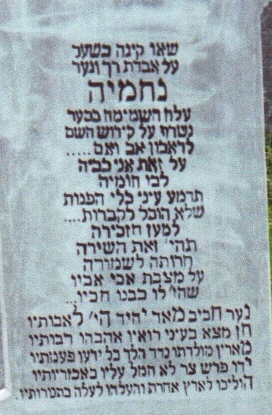|
N o t e :
Here on this back side of
the gravestone, there is a beautiful epitah witten,
according to Professor Segal, "in a very moving Hebrew
rhyme" commemorating the grandson of my grandfather --a
young boy NeHemiah who was called affectionately Hemike
and who was killed in the Holocaust at Auschwitz and thus
who was unable to have a grave of his own. This little
boy was the son of one of the the two sons
(Déjó) of my grandfather and who, for a
while, lived in the same household in Carei, Romania,
where my grandfather lived and became the darling of the
house.
Finally, a special note needs to
be made with respect to the exquisite style of the
writing. The Hebrew text is a fully rhymed poem that, in
addition, contains two types of acrostic: an internal
acrostic in the 5th line from the end and, another
acrostic of the name NeHemiah springing from the last
five lines of the text.
Biblical references (provided by
Professor Segal) were embedded in the translated
verse.
 To see the English translation for the
Front face, please click on the icon at left.
To see the English translation for the
Front face, please click on the icon at left.
.
|
(1)
Take up a lamentation in the
gate
(2)
over the loss of the young
lad
(3)
N E H E M I A H
(4)
He rose to heaven in a
storm
[cf.
2 Kings 2:11]
(5)
He was burned for the sake
of the sanctification of God's name
(6)
to the desolation of his
father and mother.....
(7)
Because of this I weep
[See
Lamentations 1:47]
(8)
My heart makes a noise
[See
Jeremiah 4:19]
(9)
My eye sheds tears without
any intermission [See
Lamentations 3:49]
(10)
because he was not brought
to burial ....
(11)
As a memorial
(12)
let this poem stand
(13)
permanently craved
(14)
on the monument of his
father's father
(15)
who was as dear
[apparently,
misspelled]
to him as his own son
...
(16)
[The
words of this line form an acrostic of the name
N e H e m i a h :]
He was the most beloved only son of his fathers
(17)
He found favor in the eyes
of those who beheld him, his teachers admired him.
(18)
From the land of his birth
he wandered, the path of his footsteps is unknown.
(19)
The adversary hath spread
out his hand [Lamentations
1:10],
he had no mercy, he rejoiced in his
cruelty.
(20)
He led him to a foreign land
and offered him up as a burnt offering in his ovens.
[Last
two lines are referenced to the Holocaust]
.
|
|

|
1
2
3
4
5
6
7
8
9
10
11
12
13
14
15
16
17
18
19
20
|
|